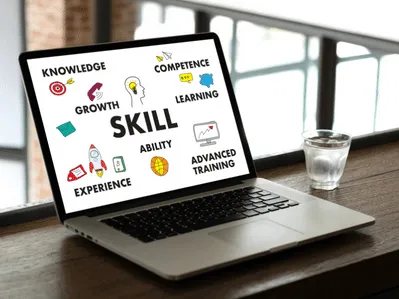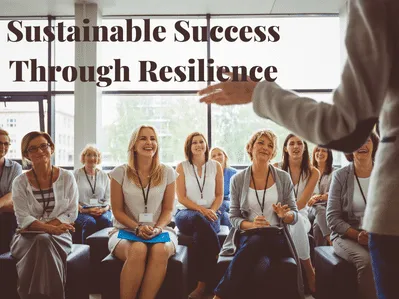
Market With Confidence ~ Attract Excited Clients
Latest Blogs: Stay up to date with the best in field...

Why Confidence Is Important
Are you a professional in the field of helping others who struggles with confidence? This blog post is for you. Today, we're diving deep into why confidence is so important for those in the helping professions, and how you can boost your own self-assurance to better serve your clients.
So sit back, relax, and let's tackle this vital topic together. 🤲
What is Confidence?
Before we can look at why confidence is important, it would be helpful to be clear on what exactly confidence is.
Looking at various definitions of confidence from the Merriam-Webster Dictionary, the Cambridge Dictionary, and various universities that have studied confidence, we can summarise confidence as:
Confidence is about feeling sure about yourself and your abilities. It involves believing in yourself, trusting your skills, and having faith in your judgment. Self-confidence is a belief in your own abilities and recognizing your strengths. It comes from setting goals, facing fears, and celebrating achievements. Confidence can also mean trusting someone else or having faith in their abilities. It gives you the courage to face challenges and can lead to success in various areas of life.
I would also add that this sense of surety that comes from being confident is not about being arrogant or thinking that you are somehow better than others. Not at all, it is more about having surety in what you can and cannot do in a realistic, secure way.
It makes sense then if you are a help professional, coach, or therapist seeking to empower others that you first feel sure of your abilities, secure in the knowledge that you have the tools to be able to support your clients to feel better about themselves.
How Being Confident Impacts Your Reputation
People are drawn to confident people. This is a fact. We respect those who are confident more than we respect those who may stumble over their words and appear insecure. Confident, not arrogant.
There is a different energy around those who feel comfortable with who they are compared to those who feel insecure.
Why is this?
Well, for starters, someone who is comfortable with themselves, knows they are not perfect and is o.k with that. They relish the opportunity to learn and grow. They see mistakes as a chance to improve and not a reflection of their character.
Compare this with someone who is insecure. When you're insecure it's easy to think that any mistakes you make will be viewed somehow as proof that you can't do it, that you're not enough. This in turn decreases your sense of worth.
Confident people take criticism well, responding to any negative comments by acknowledging them as the view of the speaker and not necessarily the truth. Confident people accept they do not get it "right" every time and are open to ideas for improvement.
Confident people know that negative comments are not a reflection of who they are as a person because oftentimes the person making the comments does not know the speaker.
Confident people do not need to feel defensive and so they welcome differences of opinion and constructive debate.
On the other hand, a person who is insecure will often become defensive when others do not agree with their viewpoint and may even feel the need to attack the other party, seeking to diminish their views in order to raise their own.
For these reasons, it's more comfortable to be around confident people.
Confident people create an atmosphere of welcome and inclusion. They are also clear on their boundaries and the behaviour and comments they will tolerate and those they will not.
Confident people will not accept personal attacks on themselves or on others. They are able to find the words that respectfully acknowledge that everyone has a right to their opinion but there is a way to express that opinion that does not seek to tear others down.
When you are confident, it's easier to look others in the eye when speaking. This makes you feel authentic and genuine, two more attributes that are highly attractive to most people.
Confidence and Persuasion
When you are confident you respect yourself and others equally. When someone feels you respect them they are more likely to listen to you. As a result, what you say will be heard. You are able to put your case clearly, without prejudice and the result of this is it becomes more persuasive.
Why Isn't Everyone Confident?
Looking at the list of what confidence is and the impact being confident has you may be wondering why then is it that so many professionals feel insecure and not confident in themselves.
This is a great question.
The answer lies somewhere between childhood and life experiences.
The truth is we are all born confident. Think of the child who fearlessly explores a climbing frame, jumping from monkey bars to slides, climbing rope ladders with no thought of falling or hurting themselves.
Sadly though, this in-born confidence becomes lost through experience. All it takes is a nasty trip and fall to teach a child to approach life with more care.
If as a child you were repeatedly told you wouldn't amount to anything, that you were lazy and a 'good-for-nothing' it would hardly be surprising if you developed a deep sense of low worth. Right?
As we grow older, the process continues. We lose confidence with every failure and start taking to heart every harsh criticism. Soon we become so immobilized we see no way out.
However, if as a child your efforts were recognised and you were praised when you did well. Encouraged and supported. Then it is likely that you will develop into a confident adult, secure in your abilities.
An Interesting Conundrum
I recently read an interesting article that explored the impact of praise from parents on children. In essence, the report identified the danger of constantly praising a child as having the potential to create a false sense of ability, and maybe even a dependence on praise from others.
Let's look at the first point: A false sense of ability.
If you look back at the start of this article you'll notice that confidence is defined as having a realistic sense of ability and being o.k not being good at everything or knowing everything.
The danger of overpraising children is that they could believe they are good at something when in reality they are not. Instead of creating a desire to work harder and improve this could lead to complacency.
Compare this to parents who praise the effort made, recognise progress, and encourage exploration and testing. What sort of person do you think that would create? Chances are the child would develop a realistic sense of what they can do, recognise their achievements, be proud of achievements made, and yet know where they need to work harder or do more. A more balanced individual would develop as a result. Yes?
Now let's look at the second point: Overly dependent on praise.
If parents constantly praise their children it can create a dependency on praise. The child may do something only for the praise and reward they will get and not for the joy of the task itself.
Ask yourself what happens with such a child as they grow older and find themselves in situations where they are not praised or are even given constructive criticism.
Chances are that person may feel resentful or start to think they are no good simply because they didn't receive praise.
Now, I'm no expert on child development, but as a professional counsellor it makes infinite sense to me that if a dependency is created on external feedback and praise as a child. When that child becomes an adult they may become overly reliant on what other people say and think. This puts the control of their self-worth firmly into the hands of others and that's a dangerous place for it to be.
As with most things in life, there is a balance to be struck. For a person to develop a realistic sense of self there needs to be praise for a job well done, but not false praise. There needs to be encouragement when they struggle and confirmation that the caregiver believes they can do it. 6. It drives long-term results
A blog is an essential tool for building a long-term relationship with your audience. The best blogs will eventually become an extension of your company’s culture and marketing strategy, which means that each article you publish has the potential to create a lasting impact on your brand.
Your blog serves as a platform through which you can share information, knowledge, and tips on your preferred topics. This allows you to provide valuable content with value in return. The more time readers spend on your website, the more chances there are for them to get familiarized with your business and become customers down the line.
Confidence and The Help Professions
If you are a help professional - coach, counsellor, therapist, or healer, there is an inherent danger with low self-confidence. It may result in a desire to create dependency from the client on you.
Don't get me wrong here, I'm not suggesting for a minute that this is deliberate. Most ethical practitioners have the best intentions when it comes to supporting their clients to change. However, if a counsellor struggles to believe in themselves they may seek validation by continuing the therapeutic relationship beyond when it is required or needed.
The goal of any helper surely must be to create independence and empowerment for our clients. Our job is done when our clients no longer need us.
Does Confidence Last?
Winston Churchill once said, "Success is stumbling from failure to failure with no loss of enthusiasm."
The problem is, enthusiasm can be hard to come by, especially when yours has taken a beating. Setbacks and disappointments have a way of knocking it down.
We start doubting ourselves and lose sight of who we really are. Without confidence, it becomes impossible to try, guaranteeing failure.
Is All Lost If You Were Not Raised With Realistic Expectations?
This leads us to the important question, what can be done if you are not confident if you were raised to doubt yourself or fear that you were not good enough? Is all lost?
Not at all.
As someone who was raised in a negative environment, where praise was pretty much non-existent and unfavourable comparisons were made to siblings. I can confirm it is absolutely possible to shed the shackles of low self-worth and develop confidence.
But how?
This is the million-dollar question hey?
So let's end this post with some things you can do if you lack confidence and want to build self-worth...
7 Ways to Reclaim Your Confidence:
#1 Recognise failure is normal. Nothing worth achieving will happen without some bumps and setbacks along the way. The important thing to do when you're trying to regain confidence after setbacks is to realise that success is still a possibility. Remind yourself of your goal and why it's important for you. See yourself getting there and focus on the next one thing that will move you forward.
#2 Give yourself a break. There may come a time when the most constructive thing you can do is to simply walk away. When you're feeling stressed or overwhelmed, confidence can falter. Give yourself a break, do a hobby you love, or even just take a walk in nature, spend time with friends, watch a comedy to laugh. Anything that gives you time to reset and re-energise.
#3 Revisit the past. Where have you succeeded before? Where have you failed? Everything that’s come before is a teaching moment. What do you know about yourself already from these events? Understanding the “you of yesterday” is where your insights today come from. Confidence comes from using this knowledge well.
#4 Be gentle with yourself. Hating yourself for some mistake you've made isn't going to get you anywhere and only harms your confidence. Letting go of past mistakes is crucial to future success.
#5 Honour small achievements. If you’re feeling like you never do anything right, making a list of the things you do well, and the accomplishments you’ve made is a great place to start. Enlist the help of someone who knows you well, as they’re apt to think of the things you might be too close to see. Once you have your list, keep it handy and re-read it when you feel your confidence flagging.
#6 Check the self-talk. Self-talk can be particularly destructive to confidence. How do you talk to yourself? Are you patient and understanding, or do you tend toward negativity? Instead, turn your inner dialogue positive, focusing on the things you like best about yourself. Grabbing hold of those mental put-downs will preserve self-confidence. Using more realistic statements will build it up.
#7 Persist in a different way. Persistence pays off. The only way you truly fail is if you stop. If you stop trying you'll always think of yourself as a failure. Instead, get up, and try again, but do it differently. If the thing you've been trying doesn't work, try again but in a new way. Ask yourself, how you can do things differently this time, and if you're not sure, ask for help. Find someone who has achieved what you want and ask how they did it.
The Confidence Triangle... What is it and how can it help you?
Check Out Other Categories
Unleash Your Brilliance.
| Carrie Wallis Delivers Enlightened Solutions for You To Get Your Message Heard ~ Confidently Attract Excited Clients |
Become an Enlightened Affiliate - Join our Affiliate Program to Earn Commissions, click here<<




